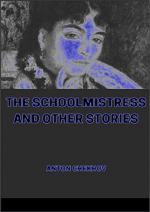“The conshtable!”
“What do you want here?”
“I have come to ask, your honor—you said this evening that you did not want the elder, but I am afraid he may be angry. He told me to go to him. Shouldn’t I go?”
“That’s enough, you bother me,” said Lyzhin with vexation, and he covered himself up again.
“He may be angry.... I’ll go, your honor. I hope you will be comfortable,” and Loshadin went out.
In the passage there was coughing and subdued voices. The witnesses must have returned.
“We’ll let those poor beggars get away early to-morrow,...” thought the examining magistrate; “we’ll begin the inquest as soon as it is daylight.”
He began sinking into forgetfulness when suddenly there were steps again, not timid this time but rapid and noisy. There was the slam of a door, voices, the scratching of a match....
“Are you asleep? Are you asleep?” Dr. Startchenko was asking him hurriedly and angrily as he struck one match after another; he was covered with snow, and brought a chill air in with him. “Are you asleep? Get up! Let us go to Von Taunitz’s. He has sent his own horses for you. Come along. There, at any rate, you will have supper, and sleep like a human being. You see I have come for you myself. The horses are splendid, we shall get there in twenty minutes.”
“And what time is it now?”
“A quarter past ten.”
Lyzhin, sleepy and discontented, put on his felt overboots, his furlined coat, his cap and hood, and went out with the doctor. There was not a very sharp frost, but a violent and piercing wind was blowing and driving along the street the clouds of snow which seemed to be racing away in terror: high drifts were heaped up already under the fences and at the doorways. The doctor and the examining magistrate got into the sledge, and the white coachman bent over them to button up the cover. They were both hot.
“Ready!”
They drove through the village. “Cutting a feathery furrow,” thought the examining magistrate, listlessly watching the action of the trace horse’s legs. There were lights in all the huts, as though it were the eve of a great holiday: the peasants had not gone to bed because they were afraid of the dead body. The coachman preserved a sullen silence, probably he had felt dreary while he was waiting by the Zemstvo hut, and now he, too, was thinking of the dead man.
“At the Von Taunitz’s,” said Startchenko, “they all set upon me when they heard that you were left to spend the night in the hut, and asked me why I did not bring you with me.”
As they drove out of the village, at the turning the coachman suddenly shouted at the top of his voice: “Out of the way!”
They caught a glimpse of a man: he was standing up to his knees in the snow, moving off the road and staring at the horses. The examining magistrate saw a stick with a crook, and a beard and a bag, and he fancied that it was Loshadin, and even fancied that he was smiling. He flashed by and disappeared.




